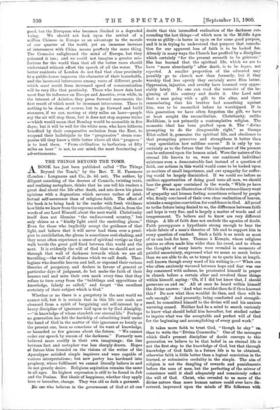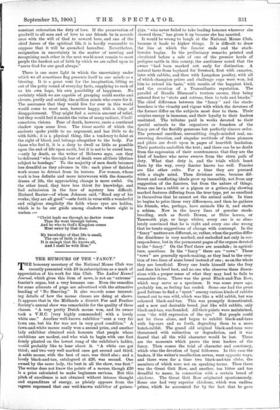THE THINGS BEYOND THE TOMB.
ABOOK has just been published called "The Things Beyond the Tomb," by the Rev. T. H. Passmore (London : Longman and Co., 2s. 6d. net). The author, by diligent searching of the decrees of Councils, twisting texts, and realising metaphors, thinks that he can tell his readers a great deal about the life after death, and sets down his pious opinions with a dogmatism which savours rather of intel- lectual self-assurance than of religious faith. The effect of the book is to bring back to the reader with fresh vividness how little we know from the supreme authority, that is, from the words of our Lord Himself, about the next world. Christianity itself does not illumine "the undiscovered country," but only shines as a " kindly light amid the encircling gloom." Even for those who implicitly accept the guidance of that light, and believe that it will never lead them over a preci- pice to annihilation, the gloom is sometimes soul-shaking, and they must often experience a sense of spiritual vertigo as they walk beside the great gulf fixed between this world and the next. It is evidently the will of God that we should not see through that wall of darkness towards which we are all travelling,—the wall of darkness which we call death. Theo- logians who describe heaven and hell, or expound their various theories of purgatory, and declare in favour of general or particular days of judgment, do but make the faith of their hearers reel and miss their own mark every time that they refuse to turn away from the " babblings and oppositions of knowledge, falsely so called," and forget "the excellent certainty of their subject which is God."
Whether or no there is a purgatory in the next world we cannot tell, but it is certain that in this life our souls are cleansed from a spirit of bargaining and self-interest by a heavy discipline of ignorance laid upon us by God Almighty, —" in knowledge of whom standeth our eternal life." Perhaps no generation has felt the hardship of submitting itself under the hand of God in the matter of this ignorance so keenly as the present one, been so conscious of its want of knowledge, or hazarded so few guesses about the future. " We cannot order our speech by reason of the darkness." Formerly men believed more readily in their own imaginings ; the line between fact and metaphor was less sharply drawn. Hopes of future bliss founded on the visions of the writer of the Apocalypse satisfied simple inquirers and were capable of various interpretations ; but now poetry has hardened into prophecy, whose fulfilment we cannot literally believe in and do not greatly desire. Religious aspiration remains the same in all ages. Its highest expression is still to be found in Job and the Psalms. But ideals of happiness, whether they apply here or hereafter, change. They wax old as doth a garment.
No one who believes in the government of God at all can
doubt that this intensified realisation of the darkness sur- rounding the last things—of which men in the Middle Ages wrote so glibly—is borne in upon us for some good purpose, and it is in trying to understand that purpose that consola- tion for our apparent loss of faith is to be looked for. Already in many ways the Church has profited by a discipline which certainly "for the present seemeth to be grievous." She has learned that the spiritual life, which we are to have "more abundantly" after death, is to be begun, not expected. A smaller proportion of the educated may possibly go to church now than formerly, but if they worship God less openly they certainly serve Him better. Oppression, injustice, and cruelty have lessened very appre- ciably lately. No one can read the memoirs of the be- ginning of this century and doubt it. Our Lord said that a man going with a gift to the altar, and there remembering that his brother had something against him, was to be reconciled before he worshipped. If in this generation we have often forgotten the gift, we have at least sought the reconciliation. Christianity, unlike Buddhism, is not primarily a contemplative religion. The monastic ideal has been grafted upon it. The " divine prompting to do the disagreeable right," as George Eliot called it, generates the spiritual life, and obedience to that prompting preserves and strengthens it better than " any speculation how sublime soever." It is only by un- certainty as to the future that the importance of the present can be enforced upon the human mind. Were the nature of the eternal life known to us, were our continued individual existence even a demonstrable fact instead of a question of faith, our actions in this world would come to be looked upon as matters of small importance, and our sympathy for suffer- ing would be largely diminished. If we could see before us endless opportunities of doing good unto all men, we should lose the great spur contained in the words, " While ye have time." We see an illustration of this in the extraordinary want of sympathy and human feeling sometimes evinced by people who, firmly convinced of their own clear realisation of heaven, mistake a sanguine conviction for confidence in God. All proof as tothe future being denied to us, the difitrence between faith and hope is very fine, and is largely a matter of words and of temperament. To believe and to know are very different things. A life of faith does not exclude the agonies of doubt. Faith presupposes a hypothesis strong enough to bear the whole fabric of a man's theories of life and to support him in every question of conduct. Such a faith is as much as most of us can look for here. Thomas I Kempis, whose religious genius so often made him wider than his creed, and to whom the thoughts of many hearts were revealed in moments of painful uncertainty, expressed what we mean so much better than we are able to do, as to tempt us to quote him at length, well known though every word of his writing is :—" When one who often anxiously wavered between hope and fear was one day consumed with sadness, he prostrated himself in prayer in church before a certain altar and revolved these things within himself, saying ` Oh, if I did but know that, I should persevere on and on.' All at once he heard within himself the divine answer: `And what wouldst thou do if thou knewest this ? Do now what thou wouldst do then, and thou wilt be safe enough.' And presently, being comforted and strength- ened, he committed himself to the divine will and his anxious wavering ceased. Neither had he a mind to search curiously to know what should befall him hereafter, but studied rather to inquire what was the acceptable and perfect will of God for the beginning and accomplishing of every good work."
It takes more faith to trust God, " though he slay" us, than to write the "Divina Commedia." One of the messages which God's present discipline of doubt conveys to this generation we believe to be that belief in an eternal life is not the first step to the knowledge of God, but that through knowledge of God faith in a future life is to be obtained, otherwise faith is little better than a logical conviction in the learned, or submissive credulity in the simple. The aim of religion is not the dangling of rewards and punishments before the sons of men, but the perfecting of the mirror of conscience until it shall adequately and consciously reflect the will of God. Christ, who revealed to us more of the divine nature than mere human nature could ever have (Bs- covered, impressed upon the minds of His followers with constant reiteration the duty of love. If the preservation of goodwill to all men and of love to our friends be in accord- ance with the will of God to usward here, and one of the chief forces of the spiritual life, it is hardly reasonable to suppose that it will be quenched hereafter. Nevertheless,
resignation in uncertainty in the matter of meeting and recognising each other in the next world must remain to most people the hardest act of faith by which we are called upon to
"serve God for our good always."
There is one more light in which the uncertainty under which we all sometimes flag presents itself to our minds as a blessing. It is a great vent for the imagination, lifting us out of the petty round of everyday facts, supplying to each of us his own hope, his own possibility of happiness. No certainty which we are capable of grasping could soothe and elevate, purify and satisfy, the million minds who crave for it. The assurance that they would live for ever in this world would come to most men, however happy, with a tinge of disappointment. They might feel a certain amount of relief, but they would feel it amidst the ruins of many radiant, if half- conscious, visions. Fear of death, however, casts a continual shadow upon some lives. The timor mortis of which the ancients spoke yields to no argument, and has little to do with faith ; it is a physical thing, like a tendency to faint at the sight of blood, and belongs altogether to the body. For those who feel it, it is a duty to dwell as little as possible upon the end of life upon earth, but it is not to be cured here, —only by death, as the writer of Hebrews says, can they be delivered "who through fear of death were all their lifetime subject to bondage." To the majority of men death becomes less dreadful as they advance in life : each piece of finished work seems to detract from its terrors. For women, whose work is less definite and more interwoven with the domestic drama of life, the approaching change is more awful. On the other hand, they have less thirst for knowledge, and find submission in the face of mystery leas difficult. Richard Baxter—of whom Johnson said, " Read any of his
works; they are all good"—sets forth in versewith a wonderful and religious simplicity the faith whose eyes are holden, which is to be our guide among shadows where sight is useless :— "Christ leads me through no darker rooms Than He went through before, And he who to God's Kingdom comes Must enter by that door.
My knowledge of that life is small, The eye of faith is dim; It is enough that He knows all, And I shall be with Him."







































 Previous page
Previous page